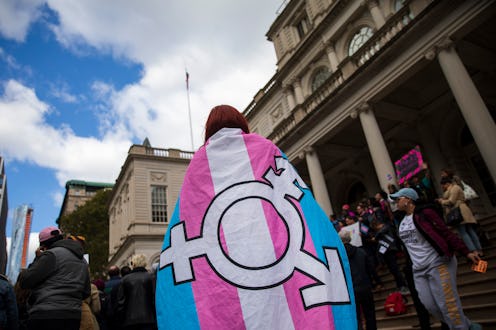Life
A New Bill Would Make It A Felony To Provide Gender-Affirming Care To Trans Youth

Medical professionals who provide affirming health care to transgender minors would be charged with a felony under a bill South Dakota lawmakers introduced on Jan. 14. The bill is the state's latest attempt at regulating the lives of trans youth: in 2016, South Dakota was the first in the nation to pass a "bathroom bill," which prohibited transgender students from using bathrooms that corresponded with their gender identity, through its legislature. Advocates tell Bustle this latest bill will criminalize the care that young trans people need to survive.
House Bill 1057 makes it illegal for a medical professional to perform gender-affirming surgeries or prescribe testosterone, estrogen, or other medication that would help "change or affirm the minor's perception of the minor's sex," the bill states. It also defines sex as "the biological state of being female or male, based on sex organs, chromosomes, and endogenous hormone profiles." The bill makes one exception: It allows parents or guardians to give doctors permission to treat a minor with "ambiguous" sex characteristics or those "diagnosed a disorder of sexual development."
A South Dakota House committee passed HB 1057 on Jan. 22. It will move to the House floor next. Gov. Kristi Noem has not committed to vetoing the bill, according to The Daily Beast.
Chase Strangio, deputy director for Transgender Justice at the ACLU LGBT & HIV Project, tells Bustle that the bill uses a medically inaccurate definition of sex and "make[s] it a crime for doctors to provide the care that their profession has determined is medically necessary." Strangio points to the fact that the American Academy of Pediatrics, the Endocrine Society, and a number of other major medical organizations have established that this kind of evidence-based treatment is consistent with their standards of care. It's "essentially a bill requiring doctors to risk the lives of their patients for no medical reason — the only reason being dislike of and fear of trans people," Strangio says.
Recent news stories involving transgender children have made their medical care a ripe topic for the spread of misinformation. In October, media across the United States reported on a Texas couple's custody battle for their 7-year-old child, who the mother, a pediatrician, maintains is a transgender girl. The child's father disagrees and also claimed that the mother wanted to medically transition the child, which the mother denies, saying it would not be appropriate for a child of that age.
The Endocrine Society issued a statement in response, writing, "Claims that a transgender child would receive surgical or irreversible hormonal treatment do not reflect the reality of medical practice." Rather, the society's evidence-based guideline recommends that transgender people of all ages "be encouraged to experience living in the new gender role and assess whether this improves their quality of life," while receiving ongoing mental health care. When a transgender adolescent can receive hormones or gender affirmation surgery is often determined on a case by case basis by their medical provider, but many medical organizations recommend deferring hormones until the individual is 16 years old. The Endocrine Society also noted that trans people who are denied health care are more likely to report having suicidal thoughts or suicide attempts.
Susan Williams, founder and executive director of The Transformation Project, a South-Dakota based nonprofit that supports trans youth and their families, tells Bustle that legislation that targets trans youth has been ongoing in South Dakota for over five years. "At this point the legislators who have been pushing these bills have had ample time to hear the voices and stories of the kids these bills will harm the most," she says. The fact that they continue to file bills like HB 1057 "displays a shocking disregard for the well-being of kids," according to Williams.
"[This bill] takes away people's ability to live safely and healthily and fully."
By making an exception for the medical treatment of babies born with "ambiguous" sex characteristics, Strangio says the bill also encourages surgical intervention for intersex babies, which "is medically unnecessary and harmful to intersex young people." He notes that not only is performing surgery on intersex babies done without their consent, but the practice is also considered torture by the United Nations.
Strangio says the bill sends a message that the state is so invested in "attacking a group of young people" that they are willing to criminalize the medical care they need. Trans people's "survival needs are going to become a crime," he says; the bill is as close as you can get to "criminalizing the status of being trans, because it takes away people's ability to live safely and healthily and fully."
Williams says that people who live in South Dakota who are outraged by the bill should contact their legislator. People in other states, Strangio says, should check if there's a similar bill in the works in their state. They can also raise public awareness about the HB 1057 by posting about it on social media and talking about it.
Strangio says advocates supported South Dakota organizers in 2016 to help defeat the anti-trans "bathroom bill," and the governor ultimately vetoed it. "We need people to share their stories of supporting their trans young people," he says. "We need doctors to speak out about the dangers of this type of legislation. We need everyone to talk about how as a country we're not going to tolerate our states making it a crime for some groups of people to survive."
This article was originally published on